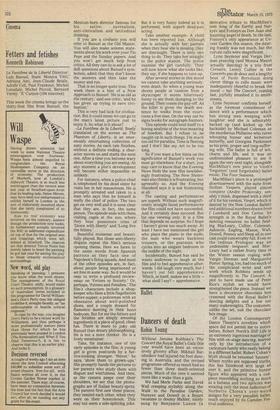Fetters and fetishes
Kenneth Robinson
Le Fantorne de /a Liberte Director: Luis Bunuel. Stars: Monica Vitti,' Adriana Asti, Jean-Claude Brialy, Adolfe Celi, Paul Frankeur, Michel Lonsdale, Michel Piccoli, Bernard Verley. 'X' Curzon (104 minutes).
This week the cinema brings us the thirty-first film from Bunuel, the Mexican-born director famous for his satire, surrealism, anti-clericalism and latitudinal thinking.
If you are a cineaste you will refer to Bunuel as the Old Master. You will also make solemn statements about his work over your Tio Pepe and the Sunday papers. And you won't get much help from critics. All they can do is ask a lot of daft questions about Bunuel's symbolism, admit that they don't know the answers and then take the money and run.
That is no longer quite true. This week there is a hint of a New Approach to Bunuel. 'He is as old as the century,' said one critic, 'and he has given up trying to save civilisation.'
This is very bad luck for civilisation. But it could mean we can go to the man's latest picture just to enjoy it. So what is it about?
Fantome de la Liberte, freely translated on the screen as The Phantom of Liberty, is an enormously entertaining collection of zany stories. As each tale finishes, without a definite ending, a character moves on and starts the next one. After a time you become wary about everything you are seeing. At any moment a plot's development will become either impossible or unlikely.
For instance, when a police chief is telephoned by his dead sister he visits her in her mausoleum. He is promptly arrested and taken to a man who says that he himself is really the chief of police. The two get on very well and it is soon clear that they are, in fact, the same person. The episode ends with them visiting cages at the zoo, where they hear passionate cries of 'Down with liberty' and 'Long live the fetters.'
Beautiful nonsense and beautifully played. But those anti-liberty slogans repeat the film's serious opening theme. Here we listen to the same words from Spanish patriots as they face one of Napoleon's firing squads. And most of the other episodes are, in fact, about people being imprisoned or set free in some way. So it would be easy to write a profound reviewessay on 'Fetters in Society.' Or, perhaps, 'Fetters and Fetishes.' The film's characters include a shopkeeper who likes a little flagellation before supper; a policeman with an obsession about well-polished shoes, and a couple dressed for flamenco dancing, in their hotel bedroom. But for me the fetters and the fetishes are simply amusing. ingredients in a piece of good, clean fun. There is more to joky old Bunuel than dreary philosophising. He is not a mere thinker. He is a lively entertainer.
Take, for instance, one of the early episodes in the film. A young girl is given postcards by a furtive-looking stranger. 'Never,' he says, 'show them to grown-ups.' She promptly hands the pictures to her parents who study them with disgust and wistfulness. And then, as the camera peeps over their shoulders, we see that the photographs are of Italian beauty-spots. The parents first saw these places, they remind each other, when they were on their honeymoon. This may not seem a side-splitting joke. But it is very funny indeed as it is performed, with superb dead-pan acting.
Take another example. A child has been reported lost. Although she is actually with her parents when they hear she is missing, they are distraught. There is only one thing to do. They take her straight to the police station. The police examine the girl carefully. They will now know what she looks like, they say, if she happens to turn up.
After several stories in this mood we cannot take anything seriously, even death. So when a young man shoots people at random from a skyscraper it seems hilariously funny to see them slumping to the ground. Then comes the pay-off. As the killer is given the death sentence he walks from the courtroom a free man. On the way out he signs books for autograph-hunters.
This episode could lend itself to a boring analysis of the true meaning of freedom. But I refuse to be caught up in such things. I'm much too old for parables. Time is fleeting and I don't like my Art to be too long.
So if you want a few hints on the significance of Bunuel's work you must go elsewhere. For a start, you may care to know that the Evening News finds the new film bewilder, ingly frustrating. The New Statesman also thinks it is frustrating, but agreeably so. And the Evening Standard says it is not frustrating at all.
The casting and performances are superb. Without such magnificently straight-faced performances the film could not have succeeded. And it certainly does succeed. But for one viewing only. It is a film that depends on surprise. So I hope I haven't given too much away. At least I have not mentioned the girl who plays the piano in the nude; the man who wears backless trousers, or the postman who cycles into an elegant bedroom in the middle of the night.
Incidentally, Bunuel has said he wants audiences to laugh at the film and to feel apprehensive afterwards. I did laugh very much, but I haven't yet felt apprehensive. Which, in itself, makes me a little — what shall I say? — apprehensive.


































 Previous page
Previous page